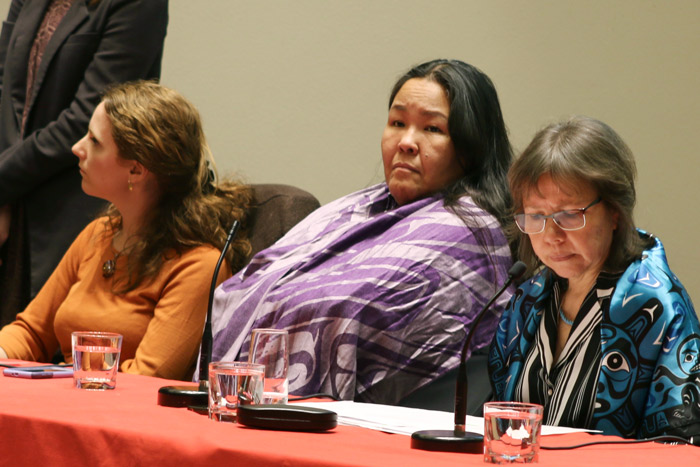On March 8, the McGill Centre for Human Rights and Legal Pluralism hosted “Stand with Us/Debout et Solidaire,” which coincided with International Women’s Day. The event focused on the issue of Missing and Murdered Indigenous Women and Girls in Canada and was organized by a host of institutions, including the Montreal Holocaust Museum, Quebec Native Women (QNW), the Indigenous Law Association at McGill, and Women in International Security Canada.
Véronique Picard and Annie Bergeron, research officers of QNW, began the discussion by presenting their research and findings on the disappearances and murders of indigenous women in Quebec. According to Picard and Bergeron, the Nānīawig Māmawe Nīnawind, Stand With Us: Missing & Murdered Indigenous Women in Quebec, a report pioneered by the QNW, statistics not only demonstrate a disparity between various organizations’ research methods, but also exhibit the exponential growth of disappearances and murders..
“[…] Trauma […] has progressively weakened the very fabric of indigenous communities,” Bergeron and Alana Boileau wrote in Stand With Us. “Mutual support, solidarity, togetherness, and belonging, the fundamental values that Indigenous People have held onto throughout their struggle to resist each attack against their culture and integrity, are seriously endangered today.”
“Sisters Come Home,” a short film by Nimiseyak Bigiiwag composed of testimonies from four Anishinabe women, followed Picard and Bergeron’s presentation. The film led to a discussion among three indigenous speakers, including Mohawk activist and artist Ellen Gabriel, UQÀM student and activist Maïtée Labrecque-Saganash, and activist Nina Segalowitz.
The discussion, moderated by McGill’s Wainwright Junior Fellow Cassandra Steer, touched on a variety of themes and topics—frustration with the Canadian government being one of many. The National Inquiry into Missing and Murdered Indigenous Women and Girls launched in September 2016, and a Quebec Provincial Inquiry followed three months later. Both inquiries follow multiple calls for action from indigenous communities and international organizations like the United Nations—but the speakers were not impressed with the government’s actions nor words.
“The Inquiry that’s going on in Quebec is a way to shut up the people who are complaining about the statistics and the racism that we have had to endure for many generations,” Gabriel said. “I wonder how much truth will be given in the Provincial Inquiry, given the fact that the [Sûreté du Québec (SQ)] have gotten rid of 38 indigenous women’s complaints so easily.”
Gabriel elaborated on systemic racism, emphasizing that Canada’s colonial legacy continues to perpetuate lethal misogyny. She stressed that without a human rights-based approach, indigenous women will continue to be marginalized and disempowered. In a blog post on her website, Gabriel addressed this in detail.
“Rooted in colonial superiority the marginalization of Konón:kwe (indigenous) women is exhibited in Canadian society through racist attitudes and government pathy with fatal consequences,” Gabriel wrote. “[….] Murdered and Missing Indigenous women remains a major human rights issue and requires all of society to become educated on how to resolve this violation through education, love, respect and compassion.”
Segalowitz said that voicing concerns and recalling personal experiences is essential to change the current narrative. Acknowledging that while it is not easy to recall potentially painful memories, she maintained that sharing one’s struggle can help to change an often frightening reality.
“For a long time, from residential schools to missing and murdered women, we haven’t been given a voice,” Segalowitz said. “So, it is very important that we share our stories to put a face to the statistics.”
When asked how non-indigenous peoples can be good allies, Gabriel was quick to respond.
“You can do something to help us,” Gabriel said. “[.…] Look at us as human beings with the right to self-determination.”








